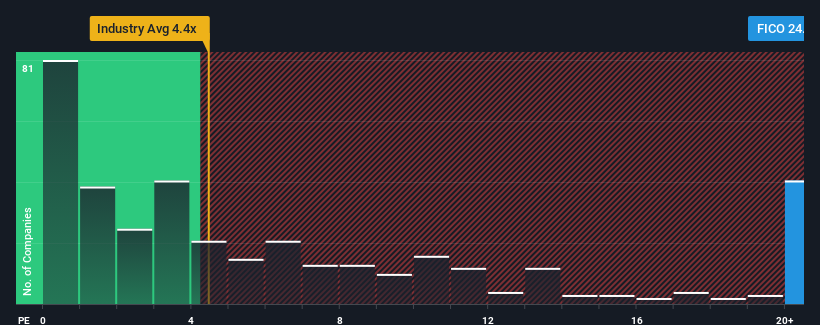- United States
- /
- Software
- /
- NYSE:FICO
Pinning Down Fair Isaac Corporation's (NYSE:FICO) P/S Is Difficult Right Now

Fair Isaac Corporation's (NYSE:FICO) price-to-sales (or "P/S") ratio of 24x might make it look like a strong sell right now compared to the Software industry in the United States, where around half of the companies have P/S ratios below 4.4x and even P/S below 1.7x are quite common. Although, it's not wise to just take the P/S at face value as there may be an explanation why it's so lofty.
View our latest analysis for Fair Isaac

What Does Fair Isaac's P/S Mean For Shareholders?
Recent times haven't been great for Fair Isaac as its revenue has been rising slower than most other companies. Perhaps the market is expecting future revenue performance to undergo a reversal of fortunes, which has elevated the P/S ratio. If not, then existing shareholders may be very nervous about the viability of the share price.
Want the full picture on analyst estimates for the company? Then our free report on Fair Isaac will help you uncover what's on the horizon.What Are Revenue Growth Metrics Telling Us About The High P/S?
The only time you'd be truly comfortable seeing a P/S as steep as Fair Isaac's is when the company's growth is on track to outshine the industry decidedly.
Taking a look back first, we see that the company managed to grow revenues by a handy 13% last year. Revenue has also lifted 20% in aggregate from three years ago, partly thanks to the last 12 months of growth. Accordingly, shareholders would have probably been satisfied with the medium-term rates of revenue growth.
Turning to the outlook, the next three years should generate growth of 13% per annum as estimated by the analysts watching the company. That's shaping up to be similar to the 14% per annum growth forecast for the broader industry.
With this in consideration, we find it intriguing that Fair Isaac's P/S is higher than its industry peers. Apparently many investors in the company are more bullish than analysts indicate and aren't willing to let go of their stock right now. Although, additional gains will be difficult to achieve as this level of revenue growth is likely to weigh down the share price eventually.
What Does Fair Isaac's P/S Mean For Investors?
We'd say the price-to-sales ratio's power isn't primarily as a valuation instrument but rather to gauge current investor sentiment and future expectations.
Seeing as its revenues are forecast to grow in line with the wider industry, it would appear that Fair Isaac currently trades on a higher than expected P/S. Right now we are uncomfortable with the relatively high share price as the predicted future revenues aren't likely to support such positive sentiment for long. This places shareholders' investments at risk and potential investors in danger of paying an unnecessary premium.
Before you settle on your opinion, we've discovered 2 warning signs for Fair Isaac that you should be aware of.
If companies with solid past earnings growth is up your alley, you may wish to see this free collection of other companies with strong earnings growth and low P/E ratios.
New: AI Stock Screener & Alerts
Our new AI Stock Screener scans the market every day to uncover opportunities.
• Dividend Powerhouses (3%+ Yield)
• Undervalued Small Caps with Insider Buying
• High growth Tech and AI Companies
Or build your own from over 50 metrics.
Have feedback on this article? Concerned about the content? Get in touch with us directly. Alternatively, email editorial-team (at) simplywallst.com.
This article by Simply Wall St is general in nature. We provide commentary based on historical data and analyst forecasts only using an unbiased methodology and our articles are not intended to be financial advice. It does not constitute a recommendation to buy or sell any stock, and does not take account of your objectives, or your financial situation. We aim to bring you long-term focused analysis driven by fundamental data. Note that our analysis may not factor in the latest price-sensitive company announcements or qualitative material. Simply Wall St has no position in any stocks mentioned.
Have feedback on this article? Concerned about the content? Get in touch with us directly. Alternatively, email editorial-team@simplywallst.com
About NYSE:FICO
Fair Isaac
Develops software with analytics and digital decisioning technologies that enable businesses to automate, enhance, and connect decisions in the Americas, Europe, the Middle East, Africa, and the Asia Pacific.
Reasonable growth potential with proven track record.
Similar Companies
Market Insights
Community Narratives



